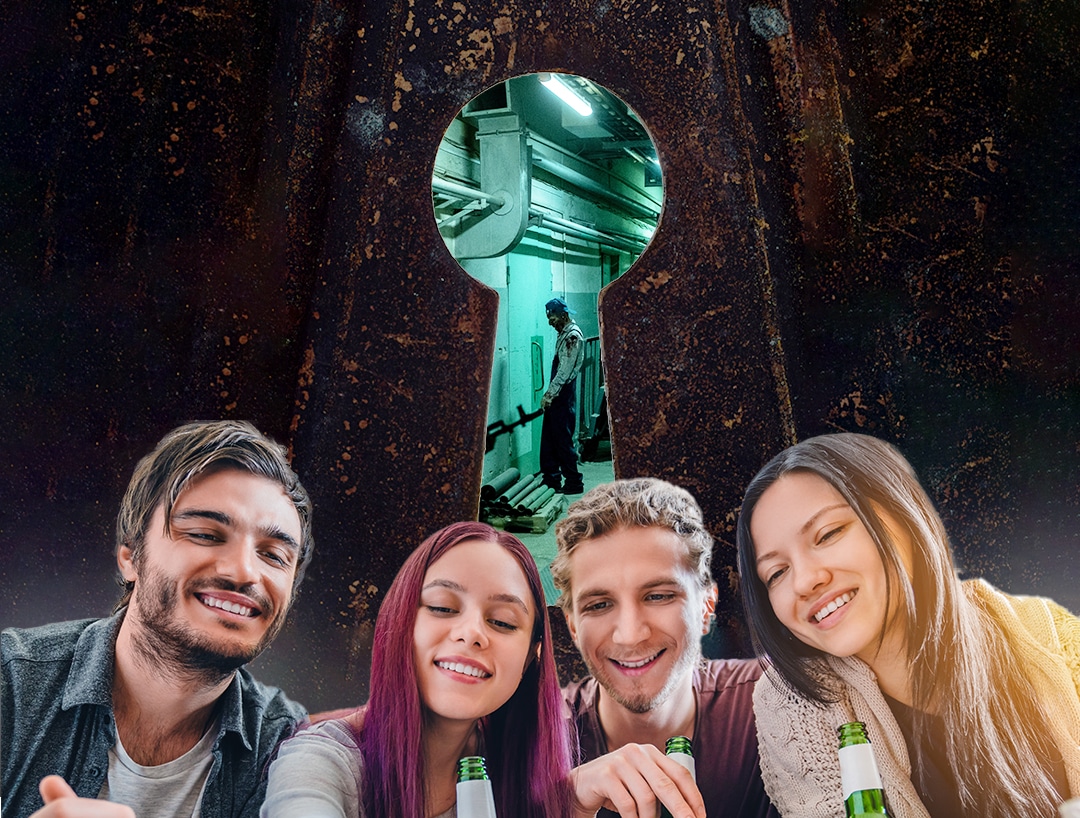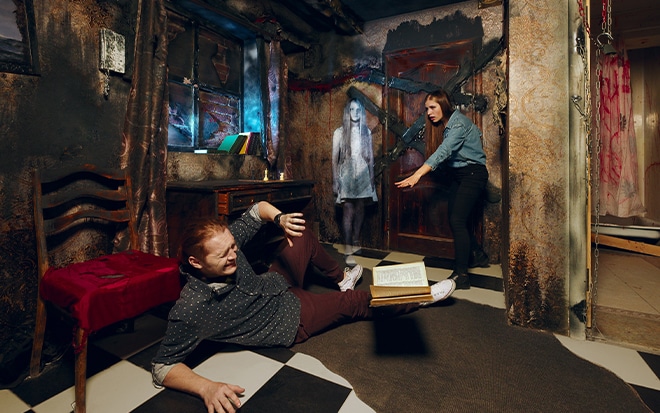Escape room games have rapidly evolved from simple video game concepts to immersive, real-life experiences that challenge participants’ problem-solving skills and teamwork abilities. This blog post will investigate the evolution of escape rooms from simple video game concepts to immersive, real-life experiences, exploring their use in education, team-building and healthcare while also highlighting some of the most popular escape room adventures.
We’ll examine the key players responsible for transforming traditional escape rooms into live-action adventures enjoyed by millions worldwide. Additionally, you’ll discover some of the most popular escape room experiences across the globe – from clueQuest’s Prof Blacksheep challenge to Sherlock Holmes-inspired mysteries.
Furthermore, we will discuss how companies are utilizing these interactive puzzles as effective team-building exercises for corporate groups. We’ll also look at educational institutions using escape room games as a means to teach complex subjects through engaging challenges.
Last but not least, learn about virtual escape rooms – an increasingly popular alternative offering unique advantages over their physical counterparts while still providing an exciting experience for puzzle enthusiasts everywhere.
Table of Contents:
- The Evolution of Escape Room Games
- Immersive Storytelling through Escape Rooms
- Team Building Benefits of Escape Room Games
- Educational Applications for Escape Rooms
- Healthcare Professionals Utilize Interactive Experiences
- Virtual Escape Rooms – An Accessible Alternative
- FAQs in Relation to Escape Room Game
- Conclusion
The Evolution of Escape Room Games
Once upon a time, in the magical world of video games, there were first-person adventure video games that paved the way for what we now know as escape room games. These traditional escape rooms have since taken over our planet with more than 50,000 epic real-life experiences worldwide.
First-person adventure video games as precursors
In their humble beginnings, escape room games found inspiration from classic first-person adventure video games like Myst, where players would explore mysterious worlds and solve puzzles to progress through the story. As technology advanced and people craved more interactive entertainment options, these digital adventures began transforming into real-life experiences.
Global spread and popularity
A big shoutout goes to Takao Kato who opened the first-ever physical escape game back in 2007 called “Real Escape Game.” This sparked a global phenomenon which led other pioneers like Victor Blake to create even more thrilling challenges such as his legendary New York-based “Escape The Room.”
- Takao Kato: Creator of Real Escape Game – Kyoto (Japan)
- Victor Blake: Founder of Escape The Room – New York City (USA)
The excitement surrounding these immersive puzzle-solving adventures has grown exponentially ever since. Now you can find everything from extreme sports-inspired themes to countdown clock ticking horror scenarios – all waiting for brave souls ready to dive head-first into an unforgettable escape room experience.
If you’re a bold explorer seeking an exciting thrill or merely yearning for a distinctive way to enjoy time with companions while deciphering puzzles, your search is over. Escape rooms offer a real escape game experience that will challenge your mind and senses. So, invite people to join you on a thrilling escape room adventure and make memories that will last a lifetime.
The Evolution of Escape Room Games has shown that first-person adventure video games have been a major influence on the development and global spread of this popular form of entertainment. Immersive Storytelling through Escape Rooms will now explore how narrative elements are combined with puzzle solving to create an unforgettable experience for players.
Immersive Storytelling through Escape Rooms
If you’ve ever wanted to be the protagonist in your own thrilling adventure, escape room games have got you covered. By combining social interaction with challenging puzzles and immersive narratives, these experiences transport players into a world where they can play detective or save the day. Let’s dive into some popular examples of story-driven escape rooms that’ll make you feel like Sherlock Holmes on steroids.
Popular Examples of Story-Driven Escape Rooms
- clueQuest: A London-based escape game that puts teams against an evil villain named Professor BlackSheep. Solve his devious puzzles before time runs out.
- Time Run: Travel through time and space as you race against the clock to recover powerful artifacts from history’s greatest minds.
- Sherlock: The Game Is Now: Step into the shoes of the famous detective himself as you work together with friends to solve cases inspired by the hit TV show.
Combining Puzzle-Solving with Narrative Elements
In traditional escape rooms, players are usually locked inside a themed environment (think haunted house or pirate ship) and must use their wits to find clues, crack codes, and ultimately unlock doors within a set timeframe – typically an hour or so. But what sets story-driven escape rooms apart is their ability to weave engaging tales throughout this process. Instead of simply solving puzzles for puzzle’s sake, players become active participants in an unfolding drama.
For example, the Escapologic escape room experience incorporates video game-style cutscenes and professional actors to create a truly immersive atmosphere. Players must work together as they navigate their way through a series of challenges while simultaneously uncovering the secrets behind a mysterious corporation’s sinister experiments.
So next time you’re looking for something more exciting than your average video games, why not invite some friends over for an unforgettable escape game adventure? Just remember – teamwork makes the dream work.
Immersive storytelling through escape rooms can be an exciting way to engage players in a narrative-driven puzzle experience. By utilizing team building benefits of escape room games, teams can work together to solve puzzles and identify training needs for the workplace.
Escape room games offer immersive storytelling experiences that combine social interaction, challenging puzzles and engaging narratives to transport players into a world where they can play detective or save the day. Popular examples of story-driven escape rooms include clueQuest, Time Run and Sherlock: The Game Is Now. These experiences weave engaging tales throughout the puzzle-solving process, making players active participants in an unfolding drama.
Team Building Benefits of Escape Room Games
If you’ve ever thought that your office could use a little more excitement, escape room games might just be the answer. These thrilling experiences have become popular team-building exercises for organizations looking to boost skills such as communication, project management, and problem-solving abilities among employees. But before you start planning an epic escape room experience, make sure there isn’t any significant conflict within your team – checking with your manager or HR department beforehand would be wise.
Identifying Training Needs through Teamwork Challenges
In traditional escape rooms, players are locked in a themed environment and must work together to solve puzzles and complete tasks under the pressure of a countdown clock. This makes them perfect for identifying training needs within teams since they require everyone to collaborate effectively in order to succeed. For example, if one person is constantly taking charge without listening to others’ ideas, it may highlight their need for better communication skills or even leadership training.
Setting up Themed Puzzle-Solving Sessions at Work
- Pick a theme: Choose an engaging theme that will resonate with your team members – think about their interests or current projects they’re working on.
- Create challenges: Design puzzles that require different skill sets so everyone has something valuable to contribute during the game.
- Add some competition: Divide people into smaller groups and encourage friendly rivalry by offering prizes (or bragging rights) for the fastest time.
- Gather feedback: After completing the escape game session(s), invite people from each group/team involved in playing these real-life extreme sports-like scenarios; this will help you understand what worked well and where improvements can be made.
Invite your colleagues to embark on an unforgettable journey, and witness the ways in which they collaborate to conquer obstacles. So go ahead – invite people to join the adventure and watch as they tackle challenges head-on.
Team building benefits of escape room games are a great way to foster collaboration and problem-solving skills among team members. By introducing educational applications for escape rooms, teams can take their learning experience to the next level with interactive gameplay that encourages engagement.
Escape room games have become popular team-building exercises for organizations looking to boost skills such as communication, project management, and problem-solving abilities among employees. They are perfect for identifying training needs within teams since they require everyone to collaborate effectively in order to succeed. By incorporating escape room games into your team-building activities, you’ll create a fun and memorable experience while uncovering valuable insights about how your team works together.
Educational Applications for Escape Rooms
Who said learning can’t be fun? Escape room games have infiltrated the educational sector, providing a unique and engaging way to teach complex subjects. Let’s dive into some innovative applications of escape rooms in schools.
Teaching Complex Subjects Using Interactive Gameplay
Gone are the days when students snoozed through dull lectures. Schools worldwide are embracing the trend of using escape rooms as an interactive teaching tool. For instance, Origenes, designed specifically for Canadian schools, educates students about their country’s electoral system through an exciting escape-room-inspired experience.
- Puzzle-solving: Students work together to solve puzzles related to various aspects of the electoral process.
- Critical thinking: By applying logic and reasoning skills, learners gain a deeper understanding of how elections work.
- Social interaction: Escape rooms encourage teamwork and communication among classmates – essential life skills.
Encouraging Student Engagement via Gamification Strategies
If you’re looking for ways to boost student engagement (and who isn’t?), look no further than gamification strategies like escape room experiences. These immersive adventures capture students’ attention while reinforcing important concepts from their curriculum. Here are some benefits:
- Increase motivation: The thrill of solving puzzles keeps students on their toes, eager to learn more.
- Better knowledge retention: When learning is enjoyable, it sticks better in our brains – just ask any real-life Sherlock Holmes fan.
- By introducing escape room games, students can hone their problem-solving abilities and thrive in this ever-evolving world.
So next time you’re planning a lesson, why not consider incorporating an escape room experience? Your students will thank you for making learning fun and memorable.
The educational applications for escape rooms are a powerful tool to teach complex topics in an engaging and interactive way. Healthcare professionals can also benefit from these immersive experiences by utilizing gamification strategies to motivate students and increase retention rates.
Healthcare Professionals Utilize Interactive Experiences
Who says healthcare professionals can’t have a bit of fun while learning? Escape room challenges are being employed in medical instruction, and it’s no shock that they’re demonstrating to be quite successful. Let’s examine the use of interactive experiences as a form of medical instruction in healthcare contexts.
Therapystein’s Impact on Student Motivation and Retention Rates
Therapystein, an escape game designed specifically for occupational therapy students, is one shining example of this innovative approach. This real-life escape room experience challenges students to solve puzzles related to two different subjects: anatomy and neurorehabilitation. The results? A significant increase in student motivation and knowledge retention rates. It seems like there might just be some method behind this madness after all.
- Increase in student motivation – Students found the Therapystein experience more engaging than traditional lectures or workshops.
- Better knowledge retention rates – By applying what they’ve learned through solving puzzles, students were able to retain information better than with conventional methods.
Potential Applications for Other Healthcare Disciplines
The success of Therapystein has opened up possibilities for other disciplines within the healthcare field. Imagine nursing students learning about medication administration by cracking codes or deciphering riddles related to drug interactions. Or perhaps physiotherapy trainees could improve their understanding of biomechanics by working together as a team in an escape room setting?
The potential applications are endless when you combine the thrill of an escape room game with the educational benefits of hands-on learning. So, healthcare professionals and educators alike, it’s time to embrace this innovative approach and watch as your students become more engaged than ever before.
Healthcare practitioners are increasingly exploring interactive experiences as a way to better connect with their patients and provide more successful treatment. Virtual escape rooms offer an accessible alternative that can be tailored to meet the needs of any healthcare discipline.
Virtual Escape Rooms – An Accessible Alternative
Do you adore the challenge of escape room games yet find it hard to get to a physical venue? Fear not, my fellow puzzle enthusiasts. The world of virtual escape rooms is here to save the day (and your wallet). These online-based experiences offer all the thrill and excitement of traditional escape rooms, without having to leave the comfort of your own home. Let’s dive into some advantages and popular examples.
Advantages of Virtual Escape Room Games
- No travel required: Save on petrol, time, and energy by playing from anywhere with an internet connection. Say goodbye to traffic jams.
- Budget-friendly: Online options are often cheaper than their physical counterparts, making them perfect for those looking for affordable entertainment.
- Safety first: If horror-themed escape rooms give you goosebumps or if extreme sports aren’t your cup of tea, virtual games provide a less scary alternative while still offering challenging puzzles.
- Inclusivity: Players with mobility issues or other disabilities can fully participate in these digital adventures without any barriers.
Popular Examples of Online-Based Escape Rooms
- The Panic Room Online: This award-winning company offers various themed games suitable for players aged eight years old and up. With different difficulty levels available, there’s something for everyone.
- The Hogwarts Digital Escape Room: Calling all Harry Potter fans. Put on your wizarding hat and solve puzzles in this magical escape room experience created by a Pennsylvania librarian.
- Breakout EDU: These educational escape games are designed for students and teachers alike, making learning fun through interactive challenges. Subjects range from science to history, so get ready to flex those brain muscles.
So there you have it – virtual escape rooms offer an accessible alternative for everyone who loves solving puzzles and embarking on thrilling adventures. Why not give one a try today?
Virtual escape rooms are a budget-friendly and accessible alternative to physical locations, offering challenging puzzles without the need for travel or fear of horror themes. Popular examples include The Panic Room Online, Hogwarts Digital Escape Room, and Breakout EDU’s educational games.
FAQs in Relation to Escape Room Game
What is the Purpose of Escape Room Games?
The primary purpose of escape room games is to provide an immersive, interactive experience where players work together to solve puzzles and challenges within a set time limit. These games encourage teamwork, critical thinking, problem-solving skills, and communication while offering an entertaining way for people to socialize and have fun.
What Skills Can You Learn from an Escape Room?
Escape rooms help develop various skills such as critical thinking, problem-solving, effective communication, collaboration, leadership abilities, and adaptability. Players also improve their attention to detail by searching for hidden clues or patterns in the game environment.
What’s the Moral of the Story in Escape Room?
The moral of most escape rooms lies in promoting teamwork and cooperation among participants. By working together effectively under pressure towards a common goal – escaping – players learn valuable lessons about trustworthiness and shared responsibility that can be applied outside of the game context.
Are Escape Room Games Good for Your Brain?
Yes. Escape rooms are beneficial for cognitive functioning as they stimulate mental processes like memory retention, pattern recognition, and logical reasoning. They also promote creative thinking through unique puzzle designs that challenge conventional thought patterns. Overall, these activities contribute positively towards maintaining a healthy brain.
Escape rooms have become increasingly popular in recent years, with many variations available to suit different preferences. Some people enjoy traditional escape rooms, while others prefer real escape games that simulate real-life scenarios. Video games have also incorporated escape room elements, bringing the experience to a wider audience. For those who enjoy extreme sports, there are even escape rooms that incorporate physical challenges and a countdown clock to increase the adrenaline rush.
If you’re looking for a fun and challenging way to spend time with friends or family, consider trying an escape room game. You can invite people to join you and work together to solve puzzles and escape before time runs out. It’s a great way to bond and develop new skills while having a blast.
Conclusion
Escape room games have come a long way from their origins in video games to become live-action adventures that challenge players to solve puzzles and play detective. With popular escape rooms around the world, team-building opportunities, educational applications, and even virtual experiences available, there is something for everyone who enjoys playing games and solving challenges.
If you’re looking for an exciting activity that will test your problem-solving skills while having fun with friends or colleagues, then consider trying an escape room game like those offered by Chilling Screams. Whether you want to experience a thrilling adventure or learn something new through gamification strategies used in healthcare education, there’s no shortage of options available. So why not invite people and give it a try today?








